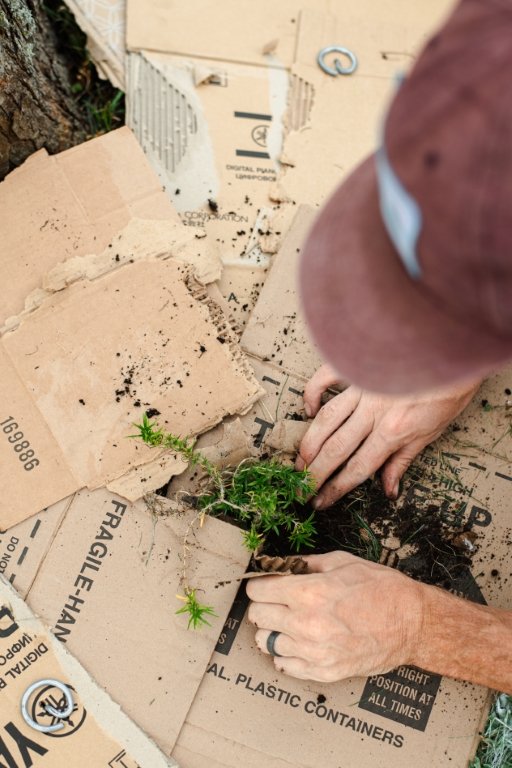Project 100 Resilient Yards
The 100 Resilient Yards project provided hands-on support to create climate resilient landscapes in private yards, the South Portland Public Library (shown here) and Organic Roots salon.
South portland “pollinates” the desire for resilient yards
By Amy Paradysz
Photos by Madeline Rheaume
Homeowners in South Portland—which has the most progressive lawncare ordinance in Maine—knew what not to do: use chemical fertilizers or pesticides that contaminate Casco Bay. But when it came to the details of how to develop an organic landscape, they had questions.
Lots of questions.
Sustainability Director Julie Rosenbach, part of a small team creating a rain garden on Stanley Street.
“We did as much outreach as we possibly could—workshops, trainings and events—but people kept saying, ‘I just have a question about my yard,’” said City of South Portland Sustainability Director Julie Rosenbach. “I told a colleague, ‘I want to [create] 100 resilient yards, and then I want those people to talk to their neighbors, then those people to do the work and talk to their neighbors.’”
It took a year to turn that idea into reality, but in March 2023, the city, with eight organizational partners and two retail partners, opened registration for a free program called 100 Resilient Yards. The Sustainability Office was looking for 100 homeowners interested in hands-on support in starting a small native plant or pollinator garden, rain garden, organic vegetable garden or organic lawn. And they got 430 applications—so many that after categorizing the requests by landscape type and neighborhood, winners were picked from a hat.
“We didn’t have the budget to do whole yards, and we wanted to be science-based as opposed to yard makeovers,” Rosenbach said. “So, as a first step, Cumberland County Soil & Water Conservation District did one-hour technical assessments, including soil tests determining what the soil needed and what will thrive there.”
Then each participant got a starter kit for their project—either a raised bed garden filled with compost and soil, starter seeds and seedlings; organic lawn products; or five native plants chosen to attract pollinators, increase biodiversity or, in areas prone to flooding, control and filter water that would otherwise puddle or flood. Volunteers coordinated site visits and supplies and did much of the hands-on site work alongside participating homeowners.
Thalia Tucker volunteered in the program during her gap year. “This is about climate resiliency and biodiversity, and it feels good to actually do something,” says the 19-year-old from Portland. “I enjoyed meeting people and talking about things like pollinator plants, climate change and environmental policy.”
Selected yards are in public-facing areas in hopes of pollinating—so to speak—the ideas of organic landscaping throughout the community.
“Neighbors would come by and ask what we were doing,” said volunteer Leah Farnam. “And that was great because we wanted others to catch the desire. We taught a lot while we were planting, and I think people will spread the word.”
Along the way, a few homeowners dropped out of the program, including several who opted to hire landscapers. But, over a period of five months, the 100 Resilient Yards program—a collaboration between the City of South Portland, nonprofits, retail partners, foundations and 25 volunteers—created 89 sustainable spaces of 100 square feet or larger.
“It wasn’t just about improving those properties,” said Will Everitt, executive director of Friends of Casco Bay. “These are all examples of gardens growing without the use of synthetic pesticides or fertilizers. They are living examples of how to grow native plants, rain gardens or organic lawns that keep Casco Bay blue—because Casco Bay is downstream from everything in the watershed.”
In addition to $14,500 in city funding, 100 Resilient Yards was supported by grants from Friends of Casco Bay via Davis Conservation Foundation, Maine Coastal Communities, and Healthy Babies, Bright Futures. Two garden center partners—Broadway Gardens from South Portland and Allen, Sterling & Lothrop from Falmouth—gave donations and significant discounts on materials.
Each partner organization—including Maine Audubon, University of Maine Cooperative Extension, Osborne Organics, Maine Organic Famers and Gardeners Association and Wild Seed Project—contributed staff time, discounts on materials or both.
When planting in grassy areas, volunteers used sheet mulching—with cardboard forming a compostable weed barrier.
While this iteration of 100 Resilient Yards included organic lawncare and vegetable gardens, Rosenbach said that any future rounds will more tightly focus on native plants, rain gardens and the increasingly popular pollinator gardens.
“By year three and beyond, a pollinator garden knits together and becomes a collaboration between you and nature,” said volunteer Brett Price, a landscape designer for Sophia Design. “It’s dynamic. Eventually you’ll get to a point where you have abundance of certain plants and you can move some out to give to a friend.”
That sharing of plantings with a friend is what happened when Leah Bruns, who has a 1/10 acre yard on O’Neil Street, was matched with volunteer Nancy Morris, a Master Gardener who lives near Willard Beach.
“I invited Leah and her kids over to see my native garden and meadow to give them ideas of what to use and what not to use,” Morris said. To complement the native plants and two apple tree seedlings contributed by the city, Morris took some plants and seeds from her own garden—including sweet fern, which reminded Bruns of growing up in the woods in New Gloucester.
Bruns’ 12-year-old daughter Emerson and 9-year-old son Bear were fascinated as Morris pointed out various species, listing their Latin names and explaining how native plants can help prevent erosion and provide habitat and food sources for butterflies and birds.
“It’s great opportunity to teach, because you’re right there when questions come up,” Morris said.
As they worked together on Bruns’ yard, all that digging turned up quite a few rocks—which, with a little paint, the kids turned into garden labels, spelling out new terms like “echinacea.”
Some days later, Morris noticed a little “Thank You” message on a rock in her yard. The kids had biked over and left a token of their gratitude.
“We only live a half mile from each other, but I don’t think I would have gotten to know them any other way,” Morris said.
These are the sorts of community connections that Rosenbach is referring to when she talks about how 100 Resilient Yards developed both “social and ecological resilience.”
“We knew that we weren’t going to totally change the landscape in one season,” Rosenbach said. “But we knew that we could go a long way in changing the paradigm—getting people to think about resilient yards and getting started on the work. And I hope it has a ripple effect.”
Siblings Emerson and Bear Welch with their newly planted Starkey apple tree seedling they named Sparky.
This article appeared in the Spring 2024 edition of Green & Healthy Maine HOMES. Subscribe today!
Find Maine experts that specialize in healthy, efficient homes in the Green Homes Business Directory.





